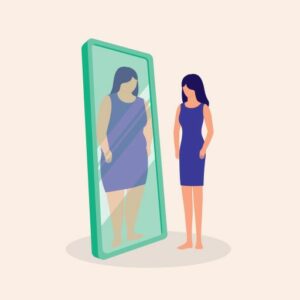7 signs your friend may have an eating disorder and how to support them
For Eating Disorder Awareness Week Healthista discovers the key signs to look out for if you suspect your loved one may be suffering with an eating disorder and how you can help them
There are over 1.25 million people in the UK struggling with an eating disorder.
The charity Beat and its campaign for Eating Disorder Awareness Week is calling for all UK medical schools and foundation programmes to introduce comprehensive training on eating disorders.
Whether seven years of age or 70, eating disorders can happen at any age.
‘One in 50 people will be affected by an eating disorder in the UK and more often than not, GPs are the first port of call for someone who is struggling,’ explains Kerrie Jones, Founder, CEO, and Psychotherapist of Orri – a specialist eating disorder treatment centre which has just been rated ‘outstanding’ by the Care Quality Commission.
There’s no ‘one way’ to have an eating disorder, and each diagnosis has a unique presentation
‘With less than an average of two hours training in eating disorders, and with patient appointments lasting an average of just ten minutes, GPs aren’t sufficiently armed with the information they need to respond to the growing population suffering with eating disorders’.
‘There’s no ‘one way’ to have an eating disorder, and each diagnosis has a unique presentation. Many of the more nuanced symptoms can risk going unnoticed if stereotypes and myths prevail,’ adds Jones.
Early intervention is critical to recovery and delayed access to treatment is just one of the risks associated with a lack of training.
If you are worried about a friend or family member who may be struggling with an eating disorder here are 7 signs you should look out for…
#1 Isolation and secrecy
Eating disorders thrive in isolation.
You might notice someone retreating back into themselves, becoming more isolated, avoiding social interaction, spending an increasing amount of time alone or not communicating as much as they used to.
These are all warning signs that something’s not quite right.
There can be a lot of shame and secrecy in the experience of an eating disorder, so creating a distance from other people serves to protect the disordered behaviour from being challenged.
It’s important to remember that the person who is suffering is likely to recognise these symptoms too.
Talking to them and gently and compassionately sharing what you are seeing, can be enough to support someone who has been in recovery and may be re-experiencing some difficult feelings again to make the changes they need.
It’s important to connect and be open, kindly saying what you see and enquiring into what they need.

#2 Preoccupation with food
You might notice that someone becoming more occupied by food – perhaps showing that they are worried about by wanting to check out what’s happening, when or maybe starting to talk more about food choices.
This can show up in someone starting to count calories, overly planning meals well in advance or appearing increasingly concerned about the preparation of food or the nutritional content.
You may notice food going missing, find wrappers or evidence of large quantities of food being eaten, or perhaps you notice someone is struggling with money which may suggest they are buying more food.
Sometimes people become focused on taking lots of pictures of foods and view lots of food-related content on different social platforms or on TV, but perhaps not actually eating much or seem to be spending long periods preparing and cooking foods.

#3 Disordered perception of body shape or weight
They may be making increasingly frequent, negative comments about their body weight or shape.
In fact, the person they see in the mirror seems to be completely different to who you see in front of you.
They might be constantly checking their reflection in the mirror and touching certain parts of their body – this is called ‘body checking’.
#4 Fear of gaining weight or pursuit of thinness
They might be cutting out entire food groups (such as carbohydrates or fats), becoming obsessed with ‘good’ or ‘bad’ food or healthy or unhealthy foods.
For some, becoming vegan or vegetarian, or following another diet that restricts certain food types, can be a means of removing fear foods, and this can become a source of tension or confusion in those around them.
They might be cutting out entire food groups (such as carbohydrates or fats)
They might be compensating for anything they eat by over-exercising or taking frequent trips to the bathroom to purge any food eaten by vomiting or taking laxatives.
#5 Psychological changes
You may have noticed they are becoming increasingly depressed or anxious – perhaps they’re easily unsettled by events around them or are becoming angry or aggressive as a defence mechanism when you try to reach out and connect.
As an eating disorder develops, a person’s sense of self-worth and mood can rapidly deteriorate. They may start to constantly question themselves, with a sense of ‘never being good enough’ creeping over them.

#6 Physical changes
A clear sign of concerning behaviour is a change in someone’s weight.
Whilst weight is by no means the only indicator of an eating disorder, a significant change in weight is important to take notice of.
You might notice that they get light-headed when getting off the sofa, complain of digestive issues, are always cold no matter how warm the environment is and looking pale and tired.
In women, their periods may have stopped, and dental issues can arise if someone is purging by vomiting.
Not all eating disorders will show up in someone’s weight, so noticing changes in someone’s skin tone, general health and wellbeing is also very important.
How to support your friend through an eating disorder…
Despite the fact that eating disorders are personal experiences and unique to the individual, they don’t just affect the individual sufferer alone, but rather, impact all different people in their lives – including friends.
Not all eating disorders will show up in someone’s weight
When we know that someone we love is struggling, it can be hard to know ‘what to do’ to support them in their hardship.
Here are our suggestions for supporting someone who is suffering with an eating disorder…
Check in with them
It’s so important that you communicate your concerns if you feel that someone is struggling. Pick a time when tensions aren’t running high and when the other person appears receptive.
Broach the topic gently, keeping in mind that despite how they appear, eating disorders are not about food.
very important to keep lines of communication open
Rather, food is a symptom of often much more complex, underlying causes, with emotional distress often at the root. Focusing on food behaviours in isolation may cause someone to become defensive or to deny their experience.
It is very important to keep lines of communication open and you may need to return to the conversation multiple times depending upon how ready they are to talk.

Signpost to specialist support services
Finding specialist help is also vitally important. An eating disorder psychotherapist, psychologist or specialist clinic, combined with a specialist dietitian, can help people understand more about their eating disorder and take important steps towards recovery.
It can be incredibly hard to witness someone you care about going through so much pain, particularly when physical symptoms can be so damaging.
remember that you can also reach out for your own help
If you are being significantly impacted by your loved one’s illness, remember that you can also reach out for your own help.
The eating disorders charity, Beat, offers a variety of online services for people suffering as well as their friends/carers.
Educate and inform yourself
The other way to help is by informing yourself about eating disorders.
There are many myths and misconceptions around eating disorders which, if acted upon, can cause more damage than good.
The person themselves may be very confused and scared by what they’re experiencing, and demonstrating a degree of understanding may serve to bridge the distance between you and their inner experience.

Remember your own self-care and boundaries
It is vitally important that you recognise and look after to your own needs, as well as the needs of those around you.
As the saying goes, ‘one cannot pour from an empty cup’. We can only care for those around us if we have enough in the tank to do so.
Boundaries are needed to ensure you tend to your needs and protect your energy. By keeping boundaries you can be a role model for self-care as well as an important source of support for them, so take care of yourself.
Let yourself off the hook from time to time, knowing that you are doing the best you can.
Avoid diet talk
Whilst eating disorders are not about food, be mindful of how you talk about food and your food choices around someone who is struggling.
By engaging in talk that labels food as ‘good’ or ‘bad’ you’ll risk exacerbating someone’s fixation on the nutritional content of food.
be mindful of how you talk about food and your food choices
Last but not least, do hold onto hope that recovery is most definitely possible and there are a number of organisations and charities out there today that can provide your friend with help.













